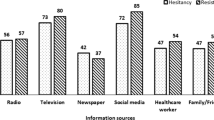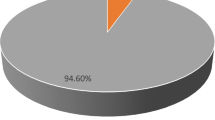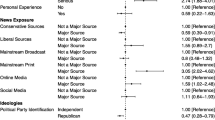Abstract
The COVID-19 pandemic led to an increased use of social media, with many people turning to it for social support. Given the varying effects of social media, this study examines how social media use influences the willingness of adults in the State of Florida to participate in COVID-19-related research. The study used data collected through the Florida Statewide Registry for Aging Studies (FSRAS), which included 587 participants who were 25 years and older. The primary outcome variables were COVID-19 treatment and COVID-19 vaccine research. Ordinal logistic regression was used to evaluate the association between social media use and willingness to participate in COVID-19 treatment and vaccination research, adjusting for sociodemographic variables. The analysis did not find a statistically significant relationship between social media use and the likelihood of participating in COVID-19 research. However, significant differences were observed across racial/ethnic groups. Participants who identified as “Hispanic/Latino” (OR-2.44, 95% CI-1.11-5.35, p = 0.03) and “Other” (OR-12.51, 95% CI-1.98-79.22, p = 0.01) were significantly associated with willingness to participate in a COVID-19 treatment research. Similarly, participants of all other races/ethnicities were significantly more willing to participate in research testing COVID-19 vaccines. Additionally, females were more likely to express willingness to participate in COVID-19 vaccine research. Social media use did not significantly affect willingness to participate in COVID-19 treatment and vaccine research; however, racial and ethnic differences significantly influenced willingness to participate. These findings suggest that implementing targeted culturally sensitive recruitment strategies and community engagement efforts can improve participation in COVID-19 research.
Similar content being viewed by others

Explore related subjects
Discover the latest articles and news from researchers in related subjects, suggested using machine learning.Change history
21 April 2025
A Correction to this paper has been published: https://doi.org/10.1007/s10900-025-01453-x
References
Ali, R., Jawed, S., Baig, M., Azam Malik, A., Syed, F., & Rehman, R. (2021). General public perception of social media, impact of COVID-19 pandemic, and related misconceptions. Disaster Medicine and Public Health Preparedness, p. 17, e23. https://doi.org/10.1017/dmp.2021.229
Allington, D., McAndrew, S., Moxham-Hall, V. L., & Duffy, B. (2021). Media usage predicts intention to be vaccinated against SARS-CoV-2 in the U.S. and the U.K. Vaccine, 39(18), 2595–2603. https://doi.org/10.1016/j.vaccine.2021.02.054
Barre, I., Cunningham-Erves, J., Moss, J., Parham, I., Alexander, L. R., & Davis, J. (2023). Motivators and barriers to COVID-19 research participation at the onset of the COVID-19 pandemic in black communities in the USA: An exploratory study. Journal of Racial and Ethnic Health Disparities, 10(6), 2890–2899. https://doi.org/10.1007/s40615-022-01466-1
Bridgman, A., Merkley, E., Loewen, P. J., Owen, T., Ruths, D., Teichmann, L., & Zhilin, O. (2020). The causes and consequences of COVID-19 misperceptions: Understanding the role of news and social media. Harvard Kennedy School (HKS) Misinformation Review. https://misinforeview.hks.harvard.edu/article/the-causes-and-consequences-of-covid-19-misperceptions-understanding-the-role-of-news-and-social-media
Campos-Castillo, C., & Laestadius, L. I. (2020). Racial and ethnic digital divides in posting COVID-19 content on social media among U.S. adults: Secondary survey analysis. Journal of Medical Internet Research, 22(7), e20472. https://doi.org/10.2196/20472
Cellini, N., Canale, N., Mioni, G., & Costa, S. (2020). Changes in sleep pattern, sense of time, and digital media use during COVID-19 lockdown in Italy. Journal of Sleep Research, 29(4), e13074. https://doi.org/10.1111/jsr.13074
Cho, H., Li, P., Ngien, A., Tan, M. G., Chen, A., & Nekmat, E. (2023). The bright and dark sides of social media use during COVID-19 lockdown: Contrasting social media effects through social liability vs. social support. Computers in Human Behavior, 146, 107795. https://doi.org/10.1016/j.chb.2023.107795
Drouin, M., McDaniel, B. T., Pater, J., & Toscos, T. (2020). How parents and their children used social media and technology at the beginning of the COVID-19 pandemic and associations with anxiety. Cyberpsychology Behavior and Social Networking, 23(11), 727–736. https://doi.org/10.1089/cyber.2020.0284
Hargittai, E. (2020). Potential biases in big data: Omitted voices on social media. Social Science Computer Review, 38(1), 10–24. https://doi.org/10.1177/0894439318788322
Hunsaker, A., & Hargittai, E. (2018). A review of internet use among older adults. New Media & Society, 20(10), 3937–3954. https://doi.org/10.1177/1461444818787348
Khubchandani, J., Sharma, S., Webb, F. J., Wiblishauser, M. J., & Bowman, S. (2020). Post-lockdown depression and anxiety in the United States during the COVID-19 pandemic. Journal of Public Health. https://doi.org/10.1093/pubmed/fdaa250
Khubchandani, J., Sharma, S., Wiblishauser, M. J., Price, J. H., & Webb, F. J. (2021). COVID-19-related information and psychological distress: Too much or too bad? Brain, Behavior, and Immunity - Health. https://doi.org/10.1016/j.bbih.2021.100213
Khubchandani, J., Sharma, S., Webb, F. J., Wiblishauser, M. J., & Sharma, M. (2022). COVID-19 infection among family and friends: The psychological impact on non-infected persons. Brain Sciences, 12(9), 1123. https://doi.org/10.3390/brainsci12091123
Laurencin, C. T., & McClinton, A. (2020). The COVID-19 pandemic: A call to action to identify and address racial and ethnic disparities. Journal of Racial and Ethnic Health Disparities, 7(3), 398–402. https://doi.org/10.1007/s40615-020-00756-0
Luo, C., Chen, A., Cui, B., & Liao, W. (2021). Exploring public perceptions of the COVID-19 vaccine online from a cultural perspective: Semantic network analysis of two social media platforms in the United States and China. Telematics and Informatics, 65, 101712. https://doi.org/10.1016/j.tele.2021.101712
Maina, I. W., Belton, T. D., Ginzberg, S., Singh, A., & Johnson, T. J. (2018). A decade of studying implicit racial/ethnic bias in healthcare providers using the Implicit Association Test. Social Science & Medicine, 199, 219–229. https://doi.org/10.1016/j.socscimed.2017.05.009
McNamara, L. A., Wiegand, R. E., Burke, R. M., Sharma, A. J., Sheppard, M., Adjemian, J., Ahmad, F. B., Anderson, R. N., Barbour, K. E., Binder, A. M., Dasgupta, S., Dee, D. L., Jones, E. S., Kriss, J. L., Lyons, B. C., McMorrow, M., Payne, D. C., Reses, H. E., Rodgers, L. E., Walker, D., Verani, J. R., & Schrag, S. J. (2022). Estimating the early impact of the US COVID-19 vaccination program on COVID-19 cases, emergency department visits, hospital admissions, and deaths among adults aged 65 years and older: An ecological analysis of national surveillance data. The Lancet, 399(10320), 152–160. https://doi.org/10.1016/S0140-6736(21)02226-1
Millett, G. A., Jones, A. T., Benkeser, D., et al. (2020). Assessing differential impacts of COVID-19 on black communities. Annals of Epidemiology, 47, 37–44. https://doi.org/10.1016/j.annepidem.2020.05.003
Montazeri, A., Mohammadi, S., Hesari, P. M., et al. (2023). Exposure to COVID-19 news on social media and consequent psychological distress and potential behavioral change. Scientific Reports, 13, 15224. https://doi.org/10.1038/s41598-023-42459-6
Ochs-Balcom, H. M., Treadwell, H. M., & Vann, P. (2015). It takes a village: Multilevel approaches to recruiting African americans and their families for genetic research. Journal of Community Genetics, 6(1), 39–45. https://doi.org/10.1007/s12687-014-0199-8
Shah, R., & Mittal, B. (1997). Toward a theory of intergenerational influence in consumer behavior: An exploratory essay. Advances in Consumer Research, 24, 55–60. Retrieved from http://acrwebsite.org/volumes/8008/volumes/v24/NA-24
Shapiro, J. R., Privor-Dumm, L., Rosser, E. N., Leng, S. X., Klein, S. L., & Morgan, R. (2023). The intersection of gender and race in older adults’ decision to receive COVID-19 vaccines. Vaccine, 41(1), 211–218. https://doi.org/10.1016/j.vaccine.2022.09.043
Thompson, H. S., Manning, M., Mitchell, J., et al. (2021). Factors associated with racial/ethnic group-based medical mistrust and perspectives on COVID-19 vaccine trial participation and vaccine uptake in the U.S. JAMA Network Open, 4(5), e2111629. https://doi.org/10.1001/jamanetworkopen.2021.11629
Tsao, S. F., Chen, H., Tisseverasinghe, T., Yang, Y., Li, L., & Butt, Z. A. (2021). What social media told us in the time of COVID-19: A scoping review. The Lancet Digital Health, 3(3), e175–e194. https://doi.org/10.1016/S2589-7500(20)30315-0
Tull, M. T., Edmonds, K. A., Scamaldo, K. M., Richmond, J. R., Rose, J. P., & Gratz, K. L. (2020). Psychological outcomes associated with stay-at-home orders and the perceived impact of COVID-19 on daily life. Psychiatry Research, p. 289, 113098. https://doi.org/10.1016/j.psychres.2020.113098
Webb, F. J., Bilello, L., Vaccaro, J., Jones, R., Neff, D., & Gaillard, T. (2024). Community engagement strategies for population health research with culturally diverse adults. Journal of Medicine Surgery and Public Health. https://doi.org/10.1016/j.glmedi.2023.100037
Wojtara, M. (2022). The effects of the COVID-19 pandemic on social media usage and body image perceptions in young adults. Undergraduate Journal of Public Health, 6. https://doi.org/10.3998/ujph.2321
Acknowledgements
The FSRAS is funded by the National Institutes of Health, National Institute on Aging (Grant #R24AG067951). We want to acknowledge all study participants, team members, and the Florida Statewide Aging Governance Engagement Council (FL-SAGE). The content is solely the responsibility of all authors. It does not represent the official views of the NIH.
Funding
This project was funded by the National Institutes of Health’s National Institute on Aging (NIH NIA—Grant #R24AG067951).
Author information
Authors and Affiliations
Contributions
Conceptualization: Jennifer E. Akpo, Fern J. Webb, Lori A. Bilello, and Caitlin Murphy; Methodology: Fern J. Webb and Trudy Gaillard; Formal Analysis: Jennifer E. Akpo, Writing- original draft preparation: Jennifer E. Akpo, and Fern J. Webb; Writing-review and editing: Jennifer E. Akpo, Fern J. Webb, Lori A. Bilello, Trudy Gaillard, Caitlin Murphy, and Jennifer Mull.
Corresponding author
Ethics declarations
Ethical Approval
FIU approved this research conducted as part of the NIA-funded FSRAS research program: FIU IRB approval #: IRB-20-0119-CR01, IRB Expiration Date: 02/18/2026. UF ceded ethical approval to FIU under ceding IRB approval #: UF IRB ceding approval #: CED000000333 IRB Ceding Expiration Date: 02/18/2026.
Informed Consent
Informed Consent was obtained from Florida International University (FIU) with collaborating institutions of the University of Florida (UF), ceding ethical approval to FIU.
Conflict of interest
The authors declare they have no conflict of interest.
Additional information
Publisher’s Note
Springer Nature remains neutral with regard to jurisdictional claims in published maps and institutional affiliations.
The original online version of this article was revised and the affiliation of the first author and the author contribution section has been updated.
Rights and permissions
Springer Nature or its licensor (e.g. a society or other partner) holds exclusive rights to this article under a publishing agreement with the author(s) or other rightsholder(s); author self-archiving of the accepted manuscript version of this article is solely governed by the terms of such publishing agreement and applicable law.
About this article
Cite this article
Akpo, J.E., Murphy, C., Mull, J. et al. Engaging with Social Media: Implications for COVID-19 Research Participation Among Adults Living in the State of Florida. J Community Health 50, 386–394 (2025). https://doi.org/10.1007/s10900-024-01409-7
Accepted:
Published:
Issue Date:
DOI: https://doi.org/10.1007/s10900-024-01409-7



